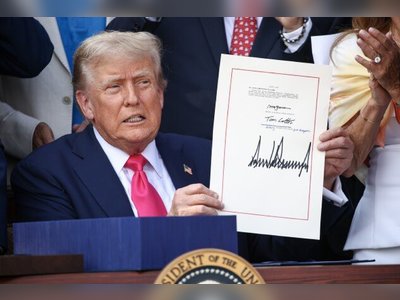End of an Era: Russian Gas Transit Through Ukraine Halts
Ukraine's decision marks a significant shift in European energy routes as a key transit agreement expires.
In a move perceived as both historic and consequential, Russian gas transit to Europe through Ukraine has officially ceased.
This decision came into effect as a crucial 2019 transit agreement lapsed on New Year’s Day.
The cessation marks the end of a notable energy route that has been in operation since the Soviet era, even enduring throughout the ongoing conflict between Russia and Ukraine.
The expiration of the transit agreement, and Ukraine's choice not to renew it, signals a strategic shift in European energy geopolitics.
Kyiv has characterized this as a transformative moment, reflecting its stance on reducing dependency on Russian energy and cutting off an economic stream that could potentially support Russian interests during the conflict.
The halt in gas flow through Ukraine comes amid an intricate backdrop of global and regional tensions and highlights shifting alliances and energy strategies in Eastern Europe.
As nations across Europe navigate the complexities of domestic energy needs and geopolitical alignments, Ukraine’s decision could prompt significant implications for energy distribution and security across the region.
The move has drawn mixed reactions, underlining the intricate balance of power, resources, and politics at play.
As Europe faces the brunt of these disruptions, considerations toward alternative energy sources and routes will likely intensify, with nations like Moldova already grappling with the immediate impacts of halted gas supplies.
The landscape of energy politics in Europe is poised for significant changes as countries adjust to this new reality.
This decision came into effect as a crucial 2019 transit agreement lapsed on New Year’s Day.
The cessation marks the end of a notable energy route that has been in operation since the Soviet era, even enduring throughout the ongoing conflict between Russia and Ukraine.
The expiration of the transit agreement, and Ukraine's choice not to renew it, signals a strategic shift in European energy geopolitics.
Kyiv has characterized this as a transformative moment, reflecting its stance on reducing dependency on Russian energy and cutting off an economic stream that could potentially support Russian interests during the conflict.
The halt in gas flow through Ukraine comes amid an intricate backdrop of global and regional tensions and highlights shifting alliances and energy strategies in Eastern Europe.
As nations across Europe navigate the complexities of domestic energy needs and geopolitical alignments, Ukraine’s decision could prompt significant implications for energy distribution and security across the region.
The move has drawn mixed reactions, underlining the intricate balance of power, resources, and politics at play.
As Europe faces the brunt of these disruptions, considerations toward alternative energy sources and routes will likely intensify, with nations like Moldova already grappling with the immediate impacts of halted gas supplies.
The landscape of energy politics in Europe is poised for significant changes as countries adjust to this new reality.












